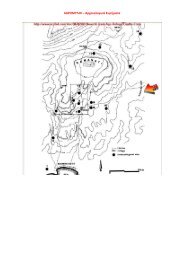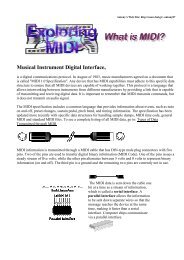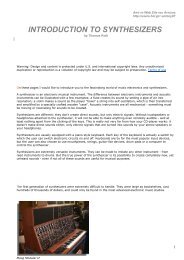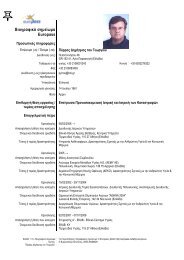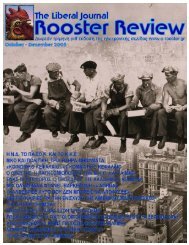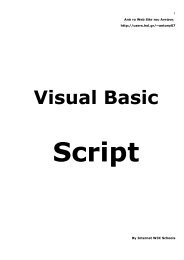Recording Handbook - Hol.gr
Recording Handbook - Hol.gr
Recording Handbook - Hol.gr
Create successful ePaper yourself
Turn your PDF publications into a flip-book with our unique Google optimized e-Paper software.
Finally, it just feels good. It's validating: "Yes, I really AM a musician, not just some boob<br />
with a guitar."<br />
1.2) Why should my band record in a studio?<br />
One word: QUALITY. Even the worst studio can give you a product that is FAR better than a<br />
four-track. Mind you, I'm not disrespecting the shoestring demo; almost every band records a<br />
practice and shops clubs with the tape. In fact, recording practices is a <strong>gr</strong>eat way to prepare for the<br />
studio.<br />
If you just want something to practice against, don't go to a studio; it's too expensive for something<br />
you're only going to practice your wicked licks with. But if anyone else is going to listen to your<br />
music, it needs to be something that doesn't have room noise, airplanes flying over (Led Zeppelin's<br />
Black Country Woman notwithstanding), noise, and muddy drums.<br />
If you haven't been to a studio, you may not be aware of the things that they can do with sound --<br />
it's pretty amazing.<br />
1.3) What is the general process involved in recording?<br />
There are 7 stages: Deciding, Preparing, <strong>Recording</strong>, Overdubbing, Mixing, Mastering, and<br />
Reproducing. (If you're with a label or have high aspirations, add Distribution at the end.)<br />
Deciding: This is where you pick a format (CD/Tape), a length (two-song demo, five-song EP,<br />
nine- to fourteen song project, twenty- to thirty- song double CD), songs, a studio, possibly a<br />
producer and/or engineer, and a duplicator.<br />
Preparing: This is where you practice, over and over and over again. Then you get together your<br />
recording money, get your gear in shape, and book time. Then practice some more.<br />
<strong>Recording</strong>: This is the time you actually spend in the soundproofed room, crooning, picking,<br />
slapping, shaking, and doing that thing you do. Compared with the time invested in everything<br />
else, it's woefully short. It's also the most fun.<br />
Mixing: Once everything is tracked (put down on master tape), it needs to be prepared for<br />
mastering. Everything is made to sound just right, noise is subtracted, reverb is added, and<br />
everything ends up on a DAT.<br />
Mastering: This is an optional (author's opinion: mandatory) step where engineers at the<br />
reproducer run your tape through the appropriate filter for the format (CD, vinyl, or tape). The<br />
dynamic range may be compressed or expanded, the whole mix is EQ'd, and everything ends up on<br />
another medium. This may be DAT or hard disk (for CD, vinyl, or tape), or 1/4" tape (for<br />
cassettes).<br />
Reproducing: For CD's, they take the final master tape/disk and create a "glass master", the glass<br />
disc that is the mirror-image of your CD. This is used to press the plastic for the CD. Cassettes are<br />
reproduced by bin-loop, where they take the 1/4" master tape, make several copies, string them<br />
together, and use that to feed a cassette-duplication machine. I'm not sure how vinyl is pressed, but<br />
you can ask any reproducer how it's done.<br />
1.4) What are the pros and cons of recording a live show?<br />
Pros: You can capture the energy of a live show. Some bands find it difficult to take the live<br />
energy and reproduce it in the studio. You can also capture the audience response. There's less<br />
recording time involved, only a few hours on-site.<br />
138<br />
138





